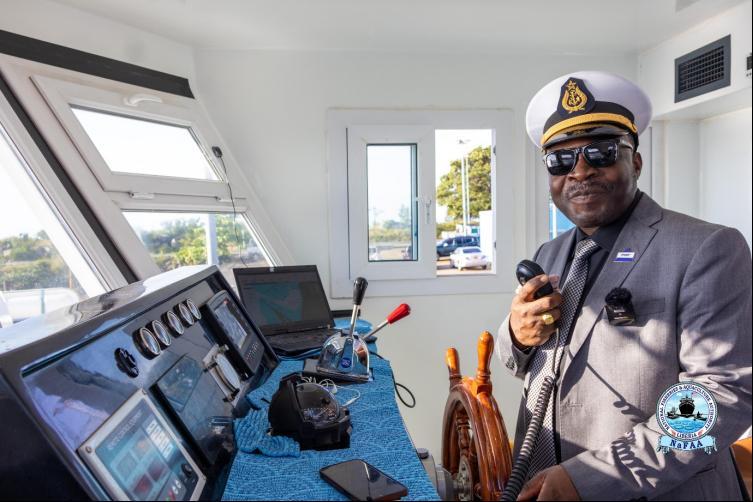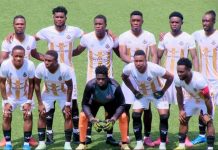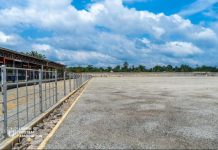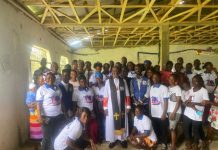Africa-Press – Liberia. The National Fisheries and Aquaculture Authority (NaFAA) has entered a new chapter under the dynamic leadership of Acting Director General J. Cyrus Saygbe, as Liberia accelerates efforts to modernize its fisheries governance, strengthen aquaculture, and expand opportunities across the nation’s coastal and inland communities.
The shift comes at a historic moment for the sector, marked by the commissioning of Sea King, Liberia’s first semi-industrial fiberglass fishing vessel, and the unveiling of 23 modern locally fabricated Kru and Fanti fiberglass canoes. The milestone signals the government’s bold intent to usher in a new era of innovation, sustainability, and economic advancement.
Vice President Jeremiah Kpan Koung, who cut the ribbons to commission the vessel during the ceremony at the Mesurado Pier on November 24, 2025, highlighted the Unity Party administration’s commitment to transforming Liberia’s coastal economy. He mentioned that the vessel will support “increased fish harvests, reduce dependence on imported fish,” and ensure that more wealth generated from Liberian waters remains within local communities.
Speaking earlier at the ceremony, NaFAA’s Acting Director General J. Cyrus Saygbe described the moment as “a national awakening,” emphasizing that the government is not merely launching a vessel, but “launching a new maritime destiny” for Liberia. The Sea King, designed using advanced Glass Reinforced Plastic technology, represents a major leap forward in safety, efficiency, durability, and sustainability.
Saygbe’s administration has also championed an aggressive reform agenda, realigning NaFAA’s operations with the Government of Liberia’s ARREST Development Strategy. Under his stewardship, the Authority has strengthened monitoring, control, and surveillance through a modern Quartermaster System; revived the Fisheries Information Management System (FIMS); established a new Department of Environment & Climate Change; and launched a National Aquaculture Database to drive evidence-based decision-making.
In addition, NaFAA has embarked on the development of a 10-Year Strategic Plan (2026–2036), a National Fisheries & Aquaculture Investment Plan, and a National Aquaculture Strategy, all aimed at transitioning the sector from subsistence to commercial and industrial capacity. Work has also resumed on the Aquaculture Center of Excellence in Klay, which is expected to become a national hub for hatcheries, training, and feed research.
The modernization drive further includes the revival of the abandoned Fisheries Complex, ongoing designs for a US$26 million Industrial Fishing Port, and decentralization initiatives that will see NaFAA establish its first Regional Office in Harper by 2026. These efforts position Liberia to attract private-sector investment and boost national competitiveness, particularly ahead of the 2026 Fisheries Investment Conference.
Saygbe also highlighted significant community-focused achievements, including the training of over 500 fish farmers, the construction of 17 FAO-supported fish processing hubs, and the award of grants to over 1,400 women in fisheries through World Bank–supported programs. He praised Liberia’s development partners for their collaboration, citing the pivotal roles of the World Bank, Conservation International, FAO, and others.
The commissioning of the Sea King and the emergence of locally built fiberglass canoes symbolize more than technological progress; they represent Liberia’s renewed confidence, resilience, and determination to redefine its fisheries sector.
As Saygbe declared: “When leadership is clear, and institutions are committed, great things are inevitable. The Sea King sails as a symbol of our rising pride and our faith in the future of this country.”
Liberia’s fisheries sector is indeed rising, anchored by strong leadership, modern reforms, and a bold vision for sustainable, inclusive national development.
Under his watch, the government has announced a nationwide reduction in the annual fisheries licensing fees, effective January 1, 2026. Under the new structure, canoe operators will pay US$30 annually, while motorized canoes, ranging from 1 to 15 horsepower, will be charged US$175. Larger vessels, between 16 to 40 horsepower, will pay US$350. He noted that the reductions demonstrate the government’s ability to listen to its people.
Also speaking, World Bank Country Manager, Madam Georgia Wallen, praised Liberia’s renewed momentum in the fisheries sector, describing the commissioning of the Sea King as “an exciting and momentous milestone.” She noted that the sector is visibly “on the rise,” reflecting strong government ownership and effective partnership with development partners.
She commended NaFAA’s leadership and technical staff for their dedication, saying it demonstrates what is possible when communities, government, and partners unite around a common vision.
For More News And Analysis About Liberia Follow Africa-Press






